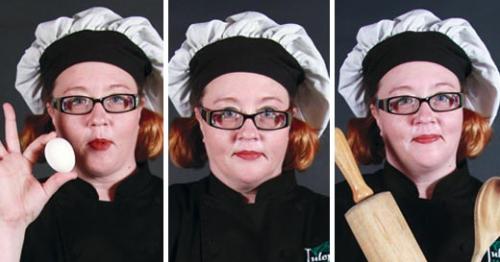I attended culinary school in a night and weekend program that lasted most of three years, while still working full time at a bank job where I had employer-assisted health insurance, paid sick days and vacation. Sometimes I look back and laugh at the fact I was putting myself in years of debt to be trained to work a job that nearly always pays less than a full-time office position, and rarely has any benefits like insurance or paid time off, but that’s a subject for another column.
I had a classmate my first semester who was outraged right out of the gate. Somehow she’d gotten the impression that culinary school was more like a sort of Beverly Hills Housewives cooking camp, wherein we’d come to class in our starched uniforms and all our ingredients would be arrayed on our stations, the potatoes already peeled and diced, proteins already trimmed and fabricated, spices and seasonings already measured out in little plastic cups. She couldn’t believe we had to blanch and peel tomatoes and take the seeds out to make concasse.
She nearly lost her mind when she figured out we had to take turns washing dishes. And when someone handed her a mop at the end of our first week, she made a dramatic little speech and bailed. Some days I envy her; at least she didn’t rack up $40K or more in student loans, and I hope she’s quite happy wherever she is working right now.
The point is: those of us already working in knew that that’s not the way a commercial kitchen works. And we knew we’d be extremely lucky to find a “line cook” position during school or just after graduating, without paying some hard dues first.
So, what’s the definition of a “line cook”? A line cook is a restaurant cook who mans the “hot line” – the line of appliances in a commercial kitchen where the dishes going out to the diners are cooked, finished and plated.
He or she doesn’t just come in to a totally set-up station. Are you serving potato puree tonight? Better get that salted water on and start peeling potatoes. Make sure you can find the potato ricer. Get that butter to room temperature. You may have to fight for a burner to heat your cream.
A line cook has a grid of small pans in his or her refrigerated station opposite the hot appliances. These pans have to be filled with fresh product (labeled and dated) before service. That means all the elements one needs to execute the dishes on the menu have to be within arms’ reach, and that cook has to make sure they are all present and accounted for. Also important: are there enough clean towels on the station to make it through service? Are the ovens on and set at the right temperature to finish steaks and other proteins, and heat bread for appetizers?
Then comes the actual service itself, which can be an out-of-body experience for a line cook if it’s busy. Churn, burn, and turn those tables. Try to stay in Chef’s good graces. Don’t eff up your steak and burger temperatures. Don’t overcook that side of vegetables. Make sure the edges of that plate are pristine before you set it in the pass. This phase goes on usually for between five and seven hours.
At the end of service, do line cooks just drop the spatula, throw their aprons in the linen bag and go outside to smoke cigarettes and drink shift beers? Nope. First of all, that grid of little pans has to be emptied and the refrigerated appliance it was set in has to be cleaned from top to bottom. The walls around the hot line have to be wiped down; the fryers have to be emptied of oil, boiled out, and refilled. Trash has to be taken out to the dumpster. Trash cans have to be scrubbed, inside and out, and refitted with fresh empty bags after they dry. Floors have to be swept, scrubbed, and mopped.
Foodies: remember all this the next time you’re feeling wistful about not being a line cook at a restaurant. We don’t have “people” to do these duties – we are those people. It comes with the territory. It’s not all glamorous all the time, but it can be very fulfilling. If you send the kitchen a tip or a beer, we won’t forget you. And you’ll get the biggest steak next time you come in.
Marsha Lynch has worked at many Louisville independent restaurants including Limestone, Jack Fry’s, Jarfi’s, L&N Wine Bar and Bistro, Café Lou Lou, Marketplace @ Theater Square, Fontleroy’s and Harvest.


